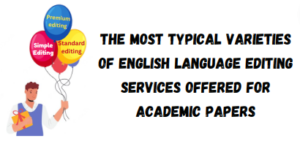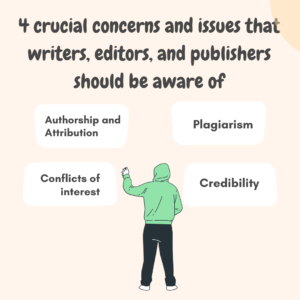The importance of language in Journal papers cannot be overstated. In addition to making it simpler for readers to comprehend and interact with the study, a well-written article with clear, concise language also increases the likelihood that it will be accepted by and published in high-impact journals. But not every author is a natural English speaker and even those who are sometimes having trouble with the subtitles of academic writing. English language editing services can help with this. This blog will discuss the many English language editing services that are offered and how they can affect a publication’s success. From this blog, we can also get some tips on how to improve the language quality of your journal paper.
The market for academic English language editing services is broad and dynamic, with new service providers and methods appearing frequently. The following are some of the most typical varieties of English language editing services offered for academic papers:
- Simple Editing: Correcting spelling, grammatical, and punctuation issues as well as making simple formatting and style changes are often included in this type of service which is called simple editing. It is typically the least expensive choice and appropriate for authors with a strong command of English who might require some assistance with editing and refining their writing.
- Standard editing: It is the kind of service that is more thorough than basic editing and often entails more thorough modifications to enhance text clarity, coherence, and sentence structure. It might also make some recommendations for rearranging the content or structure. For writers who require more in-depth assistance with their writing, standard editing is frequently more expensive than basic editing.
- Premium editing: It is the service that offers the most features for the money, as well as more comments and assistance from seasoned editors. It is also the most expensive choice. Specialised language support, such as assistance with academic terminology, writing style, or formatting standards, may be offered as part of premium editing services. Authors that need a lot of linguistic assistance and wish to maximise their chances of publication success should choose this option.
Depending on the author’s perspective and the unique circumstances surrounding the particular paper in question, the effect of English language editing services on the acceptance and publication success of research papers can vary
The likelihood of an author’s work getting accepted by prestigious journals and published in those publications is seen to be increased by authors who frequently employ English language editing services. By enhancing the paper’s language’s clarity, coherence, and overall quality, readers and reviewers will be able to comprehend the paper’s content more quickly.
It’s important to keep in mind that the impact of editing services on the acceptance and success of publications isn’t always clear. Whether a piece gets approved for publication can be greatly influenced by the quality of the research itself, as well as other factors like the topic’s applicability and compatibility with the goals and scope of the journal. In addition, some authors could decide against using editing services because they think doing so detracts from the authenticity of their work or is unnecessary.
A number of variables affect how well English language editing services can improve the linguistic quality of academic papers. The following are some of the major variables that affect how well these services work:
The effectiveness of the editing service is greatly influenced by the knowledge and experience of the editor. Language faults can be found and corrected more successfully by professional editors who are native speakers of the language and have subject-matter expertise.
Editing services can range greatly in scope, from straightforward proofreading to in-depth edits. The quality of editing and the quantity of author comments will determine how effective the service is.
Editing requirements vary depending
on the kind of paper. A research piece, for instance, might need more intensive editing than a review article. The degree of technical terminology used and how much jargon needs to be explained will depend on the type of document.
The length of time the editing service is offered can have an impact on how effective it is. A shorter deadline could lead to a less thorough editing job, whereas a longer deadline might give the editor more time to provide author-specific input.
A successful editing process depends on effective communication between the editor and the author. The author should be open to criticism and eager to make adjustments, while the editor should offer specific criticism of the language quality and recommendations for how to improve it.
The readability, clarity, and coherence of academic papers can be significantly impacted by the standard of English language editing services. This is how:
- Readability: By fixing grammar, spelling, and punctuation mistakes and making sure the material flows naturally, a good English language editing service can make an academic paper easier to read. This can help readers better understand and interact with the work.
- Clarity: A properly edited academic paper will be written in a clear, succinct language and explain its ideas and arguments in a logical sequence. This makes it simpler for readers to comprehend the value of the research and follow the author’s line of thought.
- Coherence: By ensuring that there is a coherent and clear narrative throughout, effective editing can help increase the coherence of research work. This aids readers in comprehending the connections between and contributions to the main argument made in the various sections of the article.
These elements can have a large effect on the likelihood that a research work will be accepted and referenced by other scholars. Well-written, coherent papers have a higher chance of being accepted for publishing by reputable journals since they are simpler for reviewers to comprehend and assess. Additionally, since they are simpler to read and engage with and more likely to be seen as authoritative and
valuable, papers that are well-written and clearly presented are more likely to be cited by other scholars.
The dissemination of research findings across linguistic and cultural boundaries is made possible in large part by the use of English language editing services. Some of the ways that these services aid in this process are as follows:
In order to make it easier for readers who may not be native English speakers to understand and engage with the research, English language editing services help to ensure that academic papers are written in clear, accurate, and grammatically perfect English.
Effective editing services can improve the readability and accessibility of academic papers for readers from various languages and cultural backgrounds. Making it simpler for others to interact with and expand upon the research, can aid in increasing its visibility and effect.
Editing services contribute to the reduction of language barriers that may prevent the dissemination of research findings across linguistic and cultural boundaries by raising the calibre and accessibility of academic papers written in the English language. Researchers and academics may be able to collaborate and share knowledge more frequently across national boundaries as a result.
In order to encourage diversity and inclusivity in academic publishing, effective English language editing services should ma
ke it possible for researchers from non-English speaking backgrounds to share their research findings with a wider audience. This can encourage greater variety and representation in academic publishing and work to counteract the predominance of English-language research in global academia.
Employing English language editing services poses moral issues with regard to openness, justice, and academic integrity. The following are some crucial concerns and issues that writers, editors, and publishers should be aware of :
- Authorship and Attribution: When English language editing services are used, authorship and attribution might become a subject of debate. Although editors can boost a paper’s language quality, they shouldn’t be included as co-authors because doing so would go against academic conventions and standards.
- Plagiarism: Using editing services as a strategy to hide plagiarism or other academic wrongdoing is not advised. Editors should refrain from any actions that can be construed as academic misconduct, and authors should make sure that the material of their papers is original and correctly cited.
- Conflicts of interest: When using editing services, authors should mention this in their articles, and editors should disclose any potential conflicts of interest. Preventing any potential conflicts of interest or ethical transgressions, aids in ensuring transparency and fairness in the publication process.
- Credibility: Editors and publishers should take precautions to make sure the editing services they hire are credible, dependable, and uphold moral standards. This may entail checking the credentials of editors, looking over editing samples, and keeping track of how well the editing services are doing over time.
English language editing services are just one of several types of language assistance that can assist authors in raising their level of language proficiency and increasing the likelihood that their academic papers will be published. The comparison of the effects of these various types of support is as follows:
- Writing classes: They can offer thorough training and direction on writing techniques and academic etiquette, as well as support authors in developing a deeper comprehension of the writing process. However, they could take a while and not offer the quick feedback required to fulfil publication deadlines.
- Peer criticism: It can offer authors insightful viewpoints on the quality of their writing and point up areas for growth. Peers might not always be aware of the precise criteria and conventions of academic publishing, and feedback quality and consistency can vary greatly.
- Automated tools: It like spellcheckers and grammar checkers can help identify grammar, spelling, and syntax errors quickly and efficiently. However, these tools may not always be accurate and may be unable to detect more subtle errors or issues with coherence and style.
By offering targeted, knowledgeable feedback on the language quality and style of academic papers, English language editing services can help authors improve the clarity, readability, and coherence of their writing. These services can provide the information and assistance necessary to meet publication deadlines, which can be especially useful for authors for whom English is a second language.
The most efficient usage of English language editing services and the greatest probability of academic paper publication success depends on effective author-editor teamwork. The following advice will help authors and editors work together productively:
Authors should be explicit about their expectations and objectives for the editing procedure, as well as the volume of work, deadline, and amount of detail needed. Additionally, editors must be open and honest about their abilities and experience, and they must address any queries or worries the author may have.
The success of academic papers in getting published can be significantly impacted by the employment of English language editing services. There are several options available to authors, each with its own advantages and disadvantages, as demonstrated by our comparison of various editing services.
Professional editing services continue to be the most effective in enhancing the overall calibre of academic papers, even though peer criticism and automated methods can help with language editing to some extent. To what extent these services are customised, how skilled the editors are, and how well the author and editor communicate will all affect how effective they are. It is crucial for authors to carefully weigh their alternatives and select an editing service that can cater to their unique requirements and offer top-notch support.
You can visit the website https://www.360researchpapers.com/english-language-editing.php if you want the service of English language editing at an affordable price.
Thank you for reading this blog.

